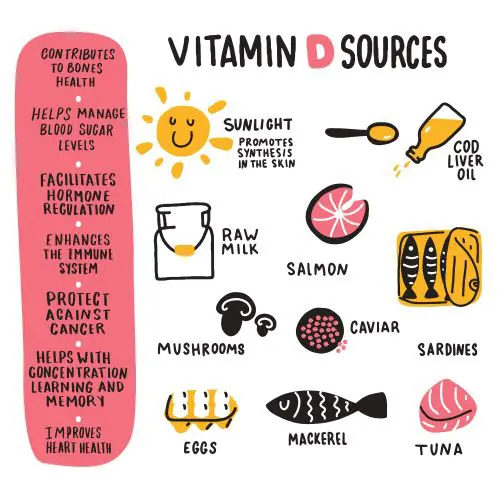To protect us, our immune system consists of complex cells, processes, and chemicals all working for the same purpose. But sometimes, our immune system needs our help to finish the job that it is meant to do. And so, through the use of the right dietary supplements, we can boost the function of our immune system, shielding ourselves against various infections and diseases.
The right supplements to help boost your immune system
Vitamin A
Many of us recognize Vitamin A as one of the main nutrients that maintain our good vision, but did you also know that Vitamin A is a supplement that can help optimize the function of the immune system? Vitamin A is also known as the “anti-inflammatory vitamin” because of its ability to enhance the anti-inflammatory response of the organism.
Scientific research published in 2019 investigated the effects of the use of Vitamin A supplementation in the treatment of the Ebola virus disease (EVD) during the West African Outbreak. The researchers aimed to prove the association between the use of Vitamin A supplementation and the mortality rates in EVD. Of the 424 cases which were analyzed, a total of 300 have been treated with the use of Vitamin A. The data later showed that the treatment with Vitamin A supplementation has efficiently reduced the mortality in these patients.
The recommended daily amount of Vitamin A is 900 mcg for men and 700 mcg for women.
Vitamin C
This is perhaps the most popular and widely used vitamin against infections of any kind. Science has demonstrated that Vitamin C supports the function of many different cells in the immune system, enhancing their ability to fight any present infection. But Vitamin C also takes part in clearing out any old and dead cells and replacing them with new ones.
Vitamin C is also a powerful antioxidant able to reduce the level of oxidative stress and free radicals in the body. Oxidative stress can seriously affect the condition of not only the immune system but the whole body in general.
A 2019 study demonstrated how the use of Vitamin C supplementation has helped shorten the duration of upper respiratory tract infections, increasing the efficiency of the overall treatment process. Not only is Vitamin C important for the treatment of this serious infection, but it also plays a great role in preventing these kinds of infections in the future.

Vitamin D Supplements for the immune system
Vitamin D is yet another vitamin supplement, essential for the health of the immune system. It is its anti-inflammatory abilities and its ability to enhance the functioning of the pathogen-fighting cells – monocytes and macrophages that makes us include Vitamin D in this list.
Unfortunately, many of us struggle with Vitamin D deficiency without being aware that low levels of Vitamin D have been associated with a greater risk of upper respiratory tract infections, influenza, and allergic asthma. This is where Vitamin D supplementation comes to help.
In 2019, a review of several control studies had shown that proper supplementation with Vitamin D has helped reduce the risk of respiratory infections in people who were once deficient in this essential micronutrient. This is an extremely important supplement for not only enhancing the function of the immune system, but some consider it to be the most important vitamin supplement, period.
Vitamin E
Besides Vitamin C, Vitamin E is also a powerful antioxidant. Because of that, it cannot only eliminate any present oxidative stress and free radicals from the body, but it is also a supplement which is able to boost the function of the immune system.
Research published in Vitamins and Hormones has investigated the use of Vitamin E for these exact purposes. The results have shown that Vitamin E supplementation can be beneficial for its immunity-boosting abilities, especially among elderly individuals. With the use of Vitamin E supplementation, the decreased cellular immunity that normally occurs due to the natural aging process, or due to AIDS, has efficiently improved.
Bromelain
Bromelain is a specific enzyme mixture normally found in pineapple. As a supplement, bromelain is used to treat different health issues – from improving digestion, relieving sinus issues, to even reducing present inflammation in the body.
According to research published in Biomedical Reports, Bromelain has promising antimicrobial, anti-inflammatory, immunomodulatory effects from which in return benefits our immune system.

Echinacea
A flowering plant by the name of Echinacea, which grows in the U.S. and Canada, has been used in medicine for centuries now. All parts of the plant have been used to create extracts, supplements, teas, etc. since Echinacea has clear health beneficial effects for the immune system. Echinacea is one of the several natural remedies found to be effective in the treatment and prevention of the common cold, influenza, and influenza-like illnesses, according to a 2017 study. Other studies have come to the same conclusion as well.
Licorice
Not talking about Twizzlers here or the super gross black stuff. Licorice is an herb that contains many helpful compounds, such as glycyrrhizin acid. Glycyrrhizin acid has proven antiviral properties against severe acute respiratory syndrome (SARS-CoV). But a 2013 review has also demonstrated its anti-inflammatory, antioxidant, and antimicrobial abilities as well, proving its use in the immunity-boosting process.
How to Boost Your Immune System Using Dietary Supplements
We have been aware of the power of the various micronutrients and herbal extracts and their benefits for our overall health for a long time now. So it should not come as a surprise to learn that the use of certain supplements can help us improve our immune system, thus preventing a long list of common infections and diseases. Vitamin A, C, D, and E are only some of the micronutrients that we mentioned in today’s article.
In general, there are about 5-6 of the best supplements to take daily that should be prioritized in order to help you maintain good health. Inflammation is a major part of maintaining health and appropriate levels of inflammation will assure a proper response. Containing chronic inflammation is a problem to almost everyone and managing that inflammatory response will help you stay healthier. One way to contain chronic inflammation is to avoid certain foods that promote it and prioritize other foods that inhibit inflammation. There are also certain foods that will boost the function of the immune system.
It is important to keep in mind that not all supplements are created equal. The same law that allows supplements to be sold to the general public for enhancing the immune system also leaves the industry with less regulation that it should. Health supplements are a multi-million dollar industry and there is not guarantee that you are getting what you pay for. There are much higher controls for supplements that are bought at a health care provider’s office. Some of the better supplement companies register with and are certified with independent organizations who test their products to ensure it contains what is claimed. An example would be the addition standards that NOW Foods products uses in maintaining addition certifications from what is required.
References
Carr AC, Maggini S. Vitamin C and Immune Function. Nutrients. 2017;9(11):1211. Published 2017 Nov 3.
Mousa HA. Prevention and Treatment of Influenza, Influenza-Like Illness, and Common Cold by Herbal, Complementary, and Natural Therapies. J Evid Based Complementary Altern Med. 2017 Jan;22(1):166-174. Epub 2016 Apr 6. Review. PubMed Roxas M, Jurenka J. Colds and influenza: a review of diagnosis and conventional, botanical, and nutritional considerations. Altern Med Rev. 2007 Mar;12(1):25-48. Review.
